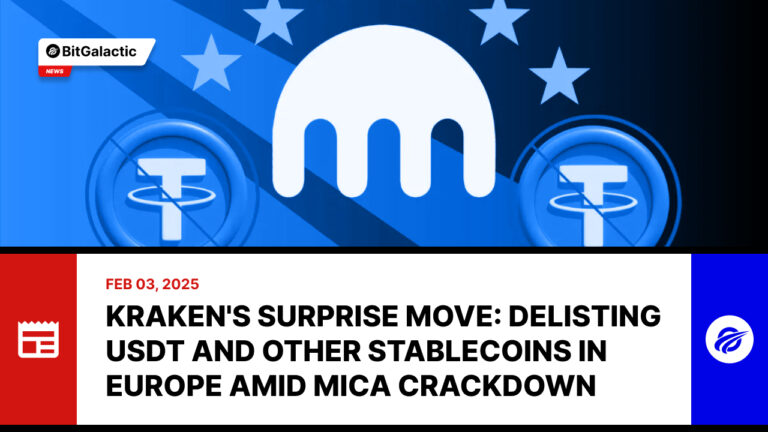Kraken's Surprise Move: Delisting USDT and Other Stablecoins in Europe Amid MiCA Crackdown.
Kraken, one of the world’s leading crypto exchanges, has announced a significant shift in its European operations by delisting multiple stablecoins, including Tether’s USDT, PayPal’s PYUSD, EURT, TUSD, and UST. This move is in response to the European Union’s new Markets in Crypto-Assets Regulation (MiCA), which imposes strict guidelines on stablecoin issuers and exchanges.
The Timeline of Delistings
Starting February 13, Kraken will begin restricting margin trading for these stablecoins, with a complete halt on spot trading set for March 24. After this deadline, open orders will be canceled, and affected stablecoins will no longer be tradable for fiat or other cryptocurrencies. The exchange has assured users that these changes are necessary to maintain compliance with MiCA while ensuring its long-term presence in the European market.
A Policy U-Turn?
Kraken’s latest decision contradicts earlier statements from Mark Greenberg, the exchange’s global head of asset management. In May 2023, Greenberg reassured European users that Kraken had no plans to delist USDT. However, with MiCA now taking full effect, Kraken appears to have no choice but to realign its strategy.
The MiCA Effect: A Game Changer for Stablecoins in Europe
MiCA introduces a standardized regulatory framework for crypto assets across the EU, with stringent requirements on stablecoin issuers. Under these rules, only licensed electronic money institutions (EMIs) or credit institutions can issue fiat-backed stablecoins in the region. This regulatory shift is forcing exchanges to reassess their stablecoin offerings, as non-compliant assets risk being excluded from the European market.
BitGalactic’s Take: A Strategic Move or Forced Compliance?
From BitGalactic’s perspective, this isn’t just about regulatory compliance—it’s also about survival and adaptability in an evolving market. Kraken’s decision aligns with broader industry trends, as other major exchanges like Crypto.com and Coinbase are making similar adjustments. Crypto.com recently announced it will delist USDT and nine other tokens, giving users until March 31 to convert their assets before they are exchanged for MiCA-compliant alternatives. Similarly, Coinbase Europe took action in December, removing USDT and other non-compliant crypto assets from its platform.
The big question now is whether stablecoin issuers will seek MiCA compliance or whether the European market will shift toward alternative digital assets. With Tether being one of the most widely used stablecoins globally, its exclusion from the European market could have ripple effects on liquidity and trading volumes.
What’s Next for European Crypto Users?
For traders and investors in the EU, the coming months will be critical in determining how the market adapts to these regulatory shifts. While some stablecoins may disappear from European exchanges, new, compliant alternatives could emerge to fill the gap.
BitGalactic will continue monitoring the situation and providing insights on how these regulatory changes reshape the crypto landscape. Stay tuned for further updates as MiCA’s full impact unfolds.
Share this post


